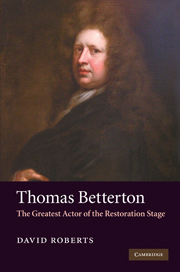Book contents
- Frontmatter
- Dedication
- Contents
- List of illustrations
- Acknowledgements
- Note on dates and texts
- Chapter 1 Introduction
- Chapter 2 Look, my lord, it comes
- Chapter 3 An obstinately shadowy Titan
- Chapter 4 An actor of London: early years, 1635–1659
- Chapter 5 A walk in the park
- Chapter 6 In the Duke’s Company, 1660–1663
- Chapter 7 Equal with the highest
- Chapter 8 Actor management
- Chapter 9 In the Company of the Duke
- Chapter 10 Union
- Chapter 11 Back to the future
- Chapter 12 Books and pictures
- Notes
- Bibliography
- Index
Chapter 8 - Actor management
running the Duke’s Company
Published online by Cambridge University Press: 05 July 2014
- Frontmatter
- Dedication
- Contents
- List of illustrations
- Acknowledgements
- Note on dates and texts
- Chapter 1 Introduction
- Chapter 2 Look, my lord, it comes
- Chapter 3 An obstinately shadowy Titan
- Chapter 4 An actor of London: early years, 1635–1659
- Chapter 5 A walk in the park
- Chapter 6 In the Duke’s Company, 1660–1663
- Chapter 7 Equal with the highest
- Chapter 8 Actor management
- Chapter 9 In the Company of the Duke
- Chapter 10 Union
- Chapter 11 Back to the future
- Chapter 12 Books and pictures
- Notes
- Bibliography
- Index
Summary
Davenant’s ‘grant’ in 1660 had been a matter of state; when he died, the succession was his family’s to decide. If that reflected a patent given him and ‘his heirs’, it was also a minor landmark in the evolution of a fully commercial theatre. Betterton and Harris ushered in the age of the actor-manager; Davenant’s death marked the decline of the courtier-manager. John Dennis thought the change wrested control from ‘Gentlemen, who had done particular services to the Crown’ and handed it to ‘illiterate, unthinking, unjust, ungrateful and sordid’ players. Written late in Betterton’s career, it was a brusque assessment for someone who had acknowledged the actor’s help with one of his plays – Dennis was really writing about Cibber, Wilks and Booth but spattered Betterton with the same brush – that also neglects the courtly inclinations of the Duke’s Company management after 1668. They were, after all, ‘sworn to attend his Royal Highnesse’ and would do so at state events such as the funeral of the first Duchess of York in 1671, which closed the theatres. Later tradition would inscribe Betterton himself as the last courtly actor-manager. His prudence in comedy told him that he would have to manage as he had acted, with a consciousness of livery. Harris’s prudence was dictated by doubling as Yeoman of the Revels; he could not supervise a masque and behave like John Lacy. The Bettertons too were in demand as acting coaches to royalty. More than discipline and commercial nous, the new management inherited from Davenant a fundamental sense of cultural affiliation. Too young to have ‘done particular services to the Crown’ during the war or its aftermath, they were, nevertheless, men of 1660.
- Type
- Chapter
- Information
- Thomas BettertonThe Greatest Actor of the Restoration Stage, pp. 102 - 119Publisher: Cambridge University PressPrint publication year: 2010



